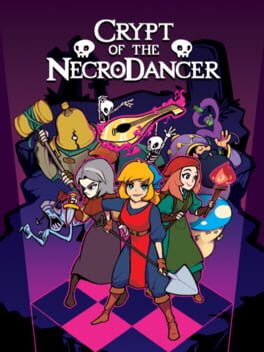For me, I think what kills the roguelike, or at least its modern incarnation, is that it hardly ever feels like what you're actually doing is all that interesting. The prominent entries of the genre are mostly barebones twin-stick shooters and top-down hacks-and-slash where the only skill that you end up learning is the ability to remember what hundreds of different enemies and upgrades do, a feat better accomplished by crawling the wiki than the dungeon. The assertion that roguelikes are the successors to arcade gaming has always been lost on me, because, in my eyes, they're really polar opposites. The best arcade games tend to have complex (but often deceptively simple) movesets and extremely basic, easily-digestible enemy types, a legacy that Cadence fulfills better than any of her peers. By default, all it takes to play Necrodancer is the four arrow keys, and yet it's able to create a sickeningly high skill ceiling, in no small part due to the crypt's inhabitants, or, more accurately, their simplicity. Enemies in this game are so absurdly basic that their AI can usually be described in less than a single sentence, meaning they don't pose any semblance of a threat by themselves. Instead, the challenge comes from clearing out a room full of them, using a set of mechanics that's, in essence, a tactical RPG where you should always be able to know what each of your opponents are going to do on their next turn. But therein lies the rub, and the justification for the light rhythm elements, because you're only given a fraction of a second to analyze each situation. The end result is an inherently fair experience- if you die, it's because your processing power isn't fast enough, not because you're unfamiliar with any of the rules. Upgrades uphold this by entirely being simple +1s to your attack, range, defense, health, or some other self-explanatory factor, but their lack of complexity doesn't stifle how much minute creativity is involved. Cleverly carving out more room for yourself, getting a dragon to take out enemies for you, or breaking a barrel with a trap to save your only bomb. All part of a language that you can feel yourself learning every time you game over, but also one that, admittedly, takes a lot of time to even start babbling in. It shouldn't be surprising that a game with this high of a skill ceiling (after forty hours I'm nowhere near good enough to beat all zones with Aria, and she's far from the hardest character) has such a steep learning curve, though I wish it was managed better, considering almost everyone I've recommended it to was able to breeze through zone 1 and then gave up on zone 2. But heed my advice, keep digging, and you'll find a challenge that genuinely rewards the work you put in.
Oh, and it should go without saying, but one of the most heart-pounding soundtracks out there. REANIMATE!
Oh, and it should go without saying, but one of the most heart-pounding soundtracks out there. REANIMATE!
7 Comments
For sure, it's becoming a lost art at this rate.
🤓
Just cause it might peak your interest, everything that separates modern roguelites from what you like about arcade games is addressed by this game. It may be up your alley.
Looks cool, thanks for the rec.
Definitely agree with a lot of what you say here, especially in regards to how people don't seem to actually get what makes a good arcade game. I remember hearing a few people saying Doom Eternal was Arcade-esque, which confused me a lot.
I did recently play Antonball Deluxe, which I thought was a really good arcade-style experience overall. Downwell also comes to mind as a pretty fun arcade-style game in recent years.
I did recently play Antonball Deluxe, which I thought was a really good arcade-style experience overall. Downwell also comes to mind as a pretty fun arcade-style game in recent years.
Yeah, I think people generally label something as arcadey based on its presentation rather than its actual design. Eternal is obviously trying to look gamey, but that doesn't necessarily mean it feels like an arcade game.

ebrl
1 year ago